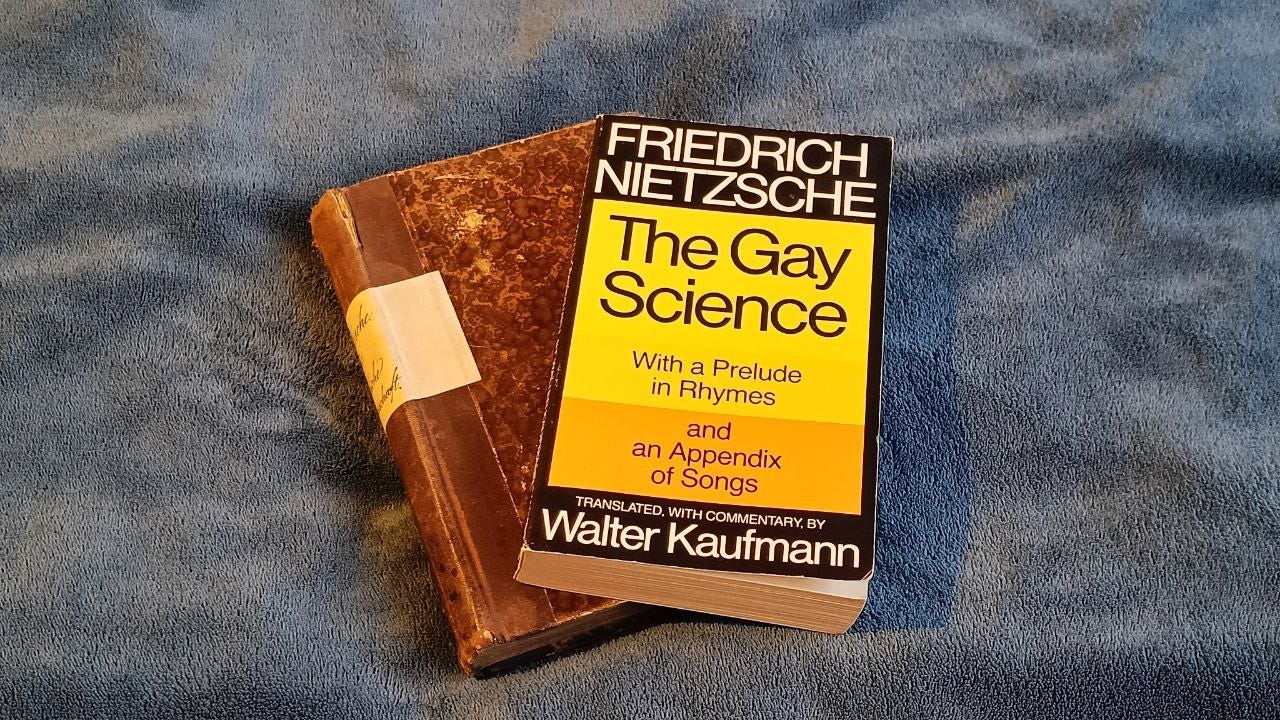After pondering on how to open this space for some time, I realized that the answer is in the title.
So let me stick to my mission of rehabilitating Friedrich Nietzsche in the public eye and quote the first passage of Book Four of The Gay Science, which I reread every New Year:
For the new year. — I still live, I still think: I still have to live, for I still have to think. Sum, ergo cogito: cogito, ergo sum [I am therefore I think: I think therefore I am]. Today everybody permits himself the expression of his wish and his dearest thought; hence I, too, shall say what it is that I wish from myself today, and what was the first thought to run across my heart this year—what thought shall be for me the reason, warranty, and sweetness of my life henceforth. I want to learn more and more to see as beautiful what is necessary in things; then I shall be one of those who make things beautiful. Amor fati: let that be my love henceforth! I do not want to wage war against what is ugly. I do not want to accuse; I do not even want to accuse those who accuse. Looking away shall be my only negation. And all in all and on the whole: some day I wish to be only a Yes-sayer.
This is the passage in which Amor fati, love of fate, is introduced by FN for the first time. And how I love the phrasing that precedes it:
to see as beautiful what is necessary in things
Among other things, this reminds of how so many people talk in terms of labour or even sacrifice when it comes to any effort, as if this wasn’t the natural state of things that you reap only what you sow, and of course sowing is going to cost you something! The thing is, very few people see the beauty in that effort. And even though I do not belong to their cohort, I still want to strive towards it, I want to learn to live like this because resentment obviously leads nowhere.
[I also view the current disclaimer culture as a nuisance, but I guess it is necessary sometimes: by the above passage I certainly do not mean those who were forced into situations in which whatever they do, whatever effort they throw in, they can barely reap anything. I recognize that The System can be cruel and that voicing our discontent is the bare minimum we should all do here. My problem is with the people that have some odd sense of entitlement to anything they want on the basis of their bare existence.]
I want to learn to appreciate life in all its seasons.
As to the Yes-saying part, I find that another passage from the same Part Four elaborates very well on this affirmative thinking:
By doing we forego.—At bottom I abhor all those moralities which say: “Do not do this! Renounce! Overcome yourself!“ But I am well disposed toward those moralities which goad me to do something and do it again, from morning till evening, and then to dream of it at night, and to think of nothing except doing this well, as well as I alone can do it. When one lives like that, one thing after another that simply does not belong to such a life drops off. Without hatred or aversion one sees this take its leave today and that tomorrow, like yellow leaves that any slight stirring of the air takes off a tree. He may not even notice that it takes its leave; for his eye is riveted to his goal—forward, not sideward, backward, downward. What we do should determine what we forego; by doing we forego—that is how I like it, that is my placitum [principle]. But I do not wish to strive with open eyes for my own impoverishment; I do not like negative virtues—virtues whose very essence it is to negate and deny oneself something.
This passage seems to explain in rather practical terms what it means to be a Yes-sayer: to say ‘yes‘ to things and pursue them, foregoing everything else, which essentially is that “looking away“ that shall be the only form of saying “no“. This is also where FN is in conflict with Stoicism that is so popular nowadays.
And what is so inspiring to me about this passage is that it does not even have to imply a huge goal: it can be applied to something extremely mundane. To use an example from my own life, this has been happening with my Instagram activity recently and it is only progressing: I picked up some physical activity, German, again (I didn’t find that old edition of The Gay Science, which can be seen in the picture alongside my go-to English one, for nothing!), and just enjoy reading even more. And if I pick up writing now, too… There’s simply no room left for strangers’ cute pets, friends’ travels, and memes. And the best thing is that it doesn’t even feel like a loss. It barely crosses my mind.
I hope that these passages challenged someone’s view of FN in a surprising way. I myself certainly see him as one of the most positive presences on my bookshelf.
So, here’s to the new year! To new beginnings! And to new lessons! ❤
… or don’t! I’m still happy that you reached the end of this post.
Cheers!





